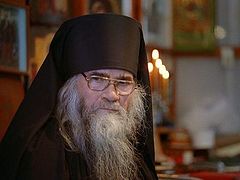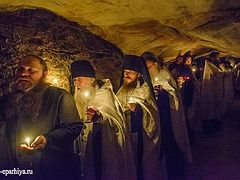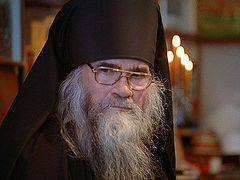Nina Alexandrovna Pavlova (1939–2015), the author of the book on the Optina New Martyrs best known in Russia, Red Pascha, was the spiritual daughter of Archimandrite Adrian (Kirsanov) for many years. Until her very death she wrote down stories of the famous elder of the Pskov Caves Monastery, and this story became a living witness.
One day, after several languishing days of waiting, we were able to make our way into elder Adrian’s cell at the cell attendant’s whispering, “Batiushka is sick. We’ve already called the ambulance from Pskov to take him to the hospital. Don’t hold batiushka up, okay?!” But we could see without the cell attendant telling us that batiushka was in poor shape, and his blessing hand was burning with fever. Everyone tries to speak briefly; only one monk starts singing like a nightingale:
“And St. Ignatius (Brianchaninov) wrote that there are no true elders anymore and no one practices the Jesus prayer, even in the monasteries.”
“Can you make it brief?” the cell attendant whispers.
“Well, if I have to be brief, then the holy fathers also confirmed, ‘Not all in the monastery are saved, and not everyone in the world perishes.’ Well in our monastery they’re not brothers but Mafiosi, and the abbot is a dragon.”
“You mean you want to leave the monastery?” asked batiushka. But do you know, brother, that a monk who leaves his monastery is considered the same as a suicide and is even deprived of a Christian burial?”
“Mama is sick,” the monk hangs his head, “and is asking me to come home.”
“Well, my mother asked me to do the same. And here was the story, brother…”
In fact I already knew this story from some of the elder’s Moscow friends. It was like this. One day Fr. Adrian received a tearful letter from his mother saying that her house had burned down and they’re living in a lean-to. And in that lean-to there is rainwater up to their knees, and his mother was seriously ill. So his mother was begging her boy to leave the monastery and come home for at least a little while to earn some money to build a new house, because she has no where else to turn. Fr. Adrian didn’t leave the monastery, but he prayed day and night to St. Nicholas of Myra and Lycea to help his ailing mother.
I don’t know how long he prayed, but suddenly someone brought him a purse with money, and in the purse was a note saying that the money is for the mother of a monk whose house burned down. It is still unknown who sent this money. But when after buying the house Fr. Adrian’s mother began looking it over, she found in the attic an icon of St. Nicholas the Wonderworker, and the saint smiled at her.
“It’s hard for you, brother, I understand,” batiushka comforted the monk and pushed a package with money into his pocket. “Someone brought me some money, you send it to your mother, so that she can buy the best medicines and good nourishment. The main thing is—have faith. The Lord will not abandon you.”
“I’m perishing, batiushka,” the monk cried. “I want to be saved but I judge everyone.”
“To that I’ll say…”
But they don’t let me say it—the ambulance has arrived. But batiushka is still trying to continue receiving people, now turning to me.
“Please answer this letter.”
I take an unopened letter from batiushka from a famous female athlete and champion, from which I learn later that after a trauma she had broken her spine and was paralyzed. No medical treatment helps, but she believes in God, was baptized in infancy, and a priest she knows gives her Holy Communion in her home.
“Write to her,” batiushka dictates, “that she is not baptized. And she is mistaken that she was baptized in infancy. There are a lot of people making that mistake now.1 But after baptism she’ll feel better—and who knows but maybe she’ll get over it completely.”
“But batiushka, you haven’t read the letter yet, haven’t even opened it,” I said perplexed.
“Didn’t I read it?” the elder mused and gave his last instruction. “While I’m gone, go to batiushka John (Krestiankin). He is spiritual, but who am I? There used to be great elders, but now there are only old men left.”
Much later, Archimandrite John (Krestiankin) wrote to me in a letter: “Fr. Adrian—that is a true elder, but I am just a “caregiver of souls”. And he repeated word-for-word what Fr. Adrian said about the former great elders and the present-day old men, meaning himself.
Elders sometimes say the same thing as each other, but they are very different. Archimandrite John had the gift of words, and to him would often come in those days famous intellectuals in order to hear the elder’s wise words. But to batiushka Adrian most often came those downtrodden people, whose lives consisted of one sorrow after another, overcome by sickness.
“Why are you coming to me in throngs?” batiushka would lament. “I’m not St. Panteleimon the Healer. Lord, there’s no peace and I have no time to pray.”
Truly, batiushka had no peace. Now he’s in the ambulance and people are thronging around it. Women are wailing, complaining to batiushka. But Fr. Adrian gives them as a consolation the care packages given him for his hospitalization. He gives me also a bag of fruit.
“Batiushka, we have plenty of fruit at home,” I refused. “Give me instead some spiritual advice for the road.”
“What are you talking about?”
“About how to live.”
“How to live?” batiushka thinks for a bit. Then he says penetratingly, as one would say about something personal. “Live simply. Look where Christ’s legs are taking Him, and follow after Him.”
The ambulance takes batiushka to the provincial hospital, and I suddenly recall—Christ’s legs are taking Him to Golgotha. It’s a narrow path, but there isn’t any other.






